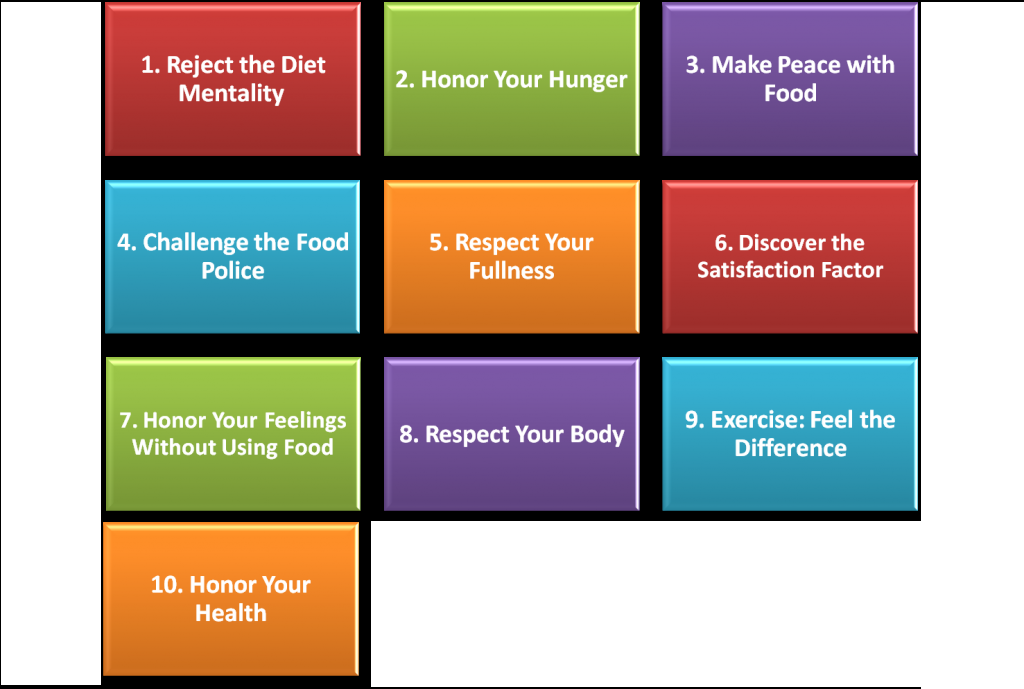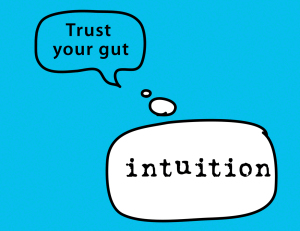 Intuitive Eating is another piece of the weight management puzzle.
Intuitive Eating is another piece of the weight management puzzle.
Intuitive Eating goes hand in hand with mindful eating and the two together will help you develop a better more natural relationship with your body and food. The Interesting thing about intuitive eating is we all at one time had the ability to do it automatically.
Think back to when you were a child way before your first diet, back when you ate and just stopped when you were no longer hungry. As small children we are born with the ability to know how much food is enough. Watch a small child at there next meal. They eat a little, then they go play, then they eat a little and go play. But for many there may have been a parent forcing you to “Clean your plate” or you can’t go out and play, or may have enticed you with “rewards” for eating beyond your fullness signal. Such as I will give you a cookie if you eat all your dinner. Or worse, maybe you were punished for not eating all your food or given the classic line I got when I was growing up “There are starving children in China that have no food and you are wasting yours”, to guilt you into eating and make you feel like a bad person. It is no wonder so many of us are afraid or wary of this style of eating. We are locked into the “Diet Rules” so we can be “In Control” and “Be Good”.
For many of us this was the beginning of distorted eating.
What is intuitive eating?
It is being back in charge by re-learning the language of our body and responding to what it is trying to tell us. It is understanding your own body and its particular needs. It is eating the way that suits YOU. Not your family, not your friends, not popular bloggers, not what the diet books you read tell you. Simply what works for YOU. It is understanding true hunger versus emotional hunger. It is letting go of food rules and labels of “good”, “bad”, “clean”, “superfood”, etc.
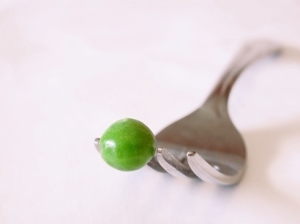 Why is it so hard for us to learn to eat intuitively (Again)?
Why is it so hard for us to learn to eat intuitively (Again)?
We don’t understand our bodies as well as we think we do. We have deep rooted notions and behaviors of how we are “supposed to” eat and don’t want to let them go. We fear losing control instead of gaining it. Or think by limiting calories/fat/carbs/eating hours/etc we in fact are in control of our bodies, when in reality that is not the case. Basically, we don’t trust ourselves.
If you have had a battle with weight for any length of time, your eating has been “from the neck up”. What do I mean by this? Your eating has been guided by your head only – your thoughts, your rules, your emotions, your past experiences, your disordered fears…not by your normal natural physiological mind-body cues. If you have restricted, binged, compulsively overeaten, purged, taken any appetite-suppressing substances or laxatives, overexercised, or a combination of these, you have “short-circuited” your natural means of detecting hunger, fullness and appetite. So, as a result of this short-circuiting, you will need to learn the skill that non-disordered people exhibit normally, until it actually becomes intuitive.
When Is a good time to learn how to eat intuitive again
The right time to start varies from person to person. If you are a newly banded patient you may need some time first getting used to having a Lap-Band. It is also advisable to have had at least one fill so that you will have the help of your Lap-band to further experience your fullness and hunger cues. In addition, look at the parallels between what you do with your food and where you are in developing your life skills as an indication of your readiness. So, as far as intuitive eating is concerned, when you are being more intuitive (guided by your gut instincts) in other areas of your life and trusting yourself with decisions regarding relationships, feelings, self-care, boundaries, etc, you will be more equipped to develop your intuitive skills regarding your eating. Overall, you will be living a more trusting relationship with yourself.
 What if, what if, what if?????
What if, what if, what if?????
Once you do start you may experience the “What if” effect, this is when fear starts to creep into your head and you start to doubt your ability to change because being more intuitive is it is a concept that is foreign. You may have racing thoughts go through your head like “what if I go out of control because I can’t do it? What if I gain too much weight because I can’t trust my inner cues or they are wrong? What if I choose all the ‘wrong’ foods and then I can’t turn back?” All these “what if’s” are a huge obstacle but they sometimes also demonstrate a lack of readiness and fear. If you have a bunch of “what if’s” about intuitive eating, DON’T turn it into a “fear fest”. If you are not ready, there isn’t a “race” to get there. So, first and foremost, when you are ready, you will hopefully know.
In this intuitive eating series, I hope to share some of the principles so that together we can learn some ways to trust our bodies. To honor our natural hunger. To declare freedom from the dieting mentality that we think we have shaken but still controls us in sneaky ways. To get back what is rightfully ours. Our happiness and our true health – physically, mentally, and emotionally. Will you join me?
Below are the 10 Intuitive Eating Principles, by Evelyn Tribole & Elyse Resch, authors of Intuitive Eating
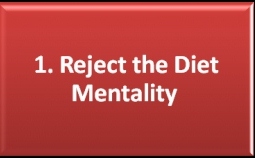 1. Reject the Diet Mentality
1. Reject the Diet Mentality
Throw out the diet books and magazine articles that offer you false hope of losing weight quickly, easily, and permanently. Get angry at the lies that have led you to feel as if you were a failure every time a new diet stopped working and you gained back all of the weight. If you allow even one small hope to linger that a new and better diet might be lurking around the corner, it will prevent you from being free to rediscover Intuitive Eating.
 2. Honor Your Hunger
2. Honor Your Hunger
Keep your body biologically fed with adequate energy and carbohydrates. Otherwise you can trigger a primal drive to overeat. Once you reach the moment of excessive hunger, all intentions of moderate, conscious eating are fleeting and irrelevant. Learning to honor this first biological signal sets the stage for re-building trust with yourself and food.
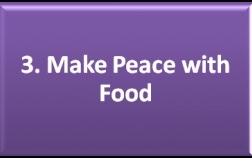 3. Make Peace with Food
3. Make Peace with Food
Call a truce, stop the food fight! Give yourself unconditional permission to eat. If you tell yourself that you can’t or shouldn’t have a particular food, it can lead to intense feelings of deprivation that build into uncontrollable cravings and, often, bingeing When you finally “give-in” to your forbidden food, eating will be experienced with such intensity, it usually results in Last Supper overeating, and overwhelming guilt.
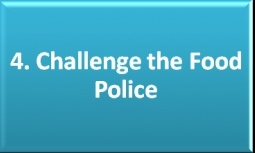 4. Challenge the Food Police
4. Challenge the Food Police
Scream a loud “NO” to thoughts in your head that declare you’re “good” for eating under 1000 calories or “bad” because you ate a piece of chocolate cake. The Food Police monitor the unreasonable rules that dieting has created. The police station is housed deep in your psyche, and its loud speaker shouts negative barbs, hopeless phrases, and guilt-provoking indictments. Chasing the Food Police away is a critical step in returning to Intuitive Eating.
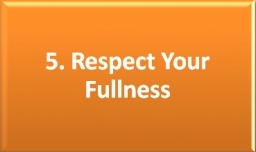 5. Respect Your Fullness
5. Respect Your Fullness
Listen for the body signals that tell you that you are no longer hungry. Observe the signs that show that you’re comfortably full. Pause in the middle of a meal or food and ask yourself how the food tastes, and what is your current fullness level?
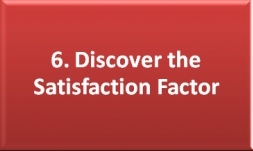 6. Discover the Satisfaction Factor
6. Discover the Satisfaction Factor
The Japanese have the wisdom to promote pleasure as one of their goals of healthy living In our fury to be thin and healthy, we often overlook one of the most basic gifts of existence–the pleasure and satisfaction that can be found in the eating experience. When you eat what you really want, in an environment that is inviting and conducive, the pleasure you derive will be a powerful force in helping you feel satisfied and content. By providing this experience for yourself, you will find that it takes much less food to decide you’ve had “enough”.
 7. Honor Your Feelings
7. Honor Your Feelings
Without Using Food Find ways to comfort, nurture, distract, and resolve your issues without using food. Anxiety, loneliness, boredom, anger are emotions we all experience throughout life. Each has its own trigger, and each has its own appeasement. Food won’t fix any of these feelings. It may comfort for the short term, distract from the pain, or even numb you into a food hangover. But food won’t solve the problem. If anything, eating for an emotional hunger will only make you feel worse in the long run. You’ll ultimately have to deal with the source of the emotion, as well as the discomfort of overeating.
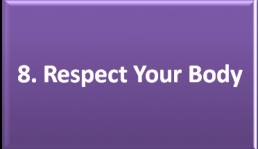 8. Respect Your Body
8. Respect Your Body
Accept your genetic blueprint. Just as a person with a shoe size of eight would not expect to realistically squeeze into a size six, it is equally as futile (and uncomfortable) to have the same expectation with body size. But mostly, respect your body, so you can feel better about who you are. It’s hard to reject the diet mentality if you are unrealistic and overly critical about your body shape.
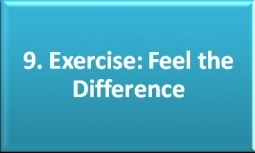 9. Exercise–Feel the Difference
9. Exercise–Feel the Difference
Forget militant exercise. Just get active and feel the difference. Shift your focus to how it feels to move your body, rather than the calorie burning effect of exercise. If you focus on how you feel from working out, such as energized, it can make the difference between rolling out of bed for a brisk morning walk or hitting the snooze alarm. If when you wake up, your only goal is to lose weight, it’s usually not a motivating factor in that moment of time.
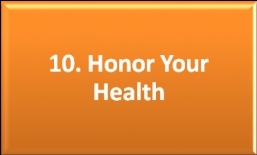 10. Honor Your Health–Gentle Nutrition
10. Honor Your Health–Gentle Nutrition
Make food choices that honor your health and taste buds while making you feel well. Remember that you don’t have to eat a perfect diet to be healthy. You will not suddenly get a nutrient deficiency or gain weight from one snack, one meal, or one day of eating. It’s what you eat consistently over time that matters; progress not perfection is what counts.

